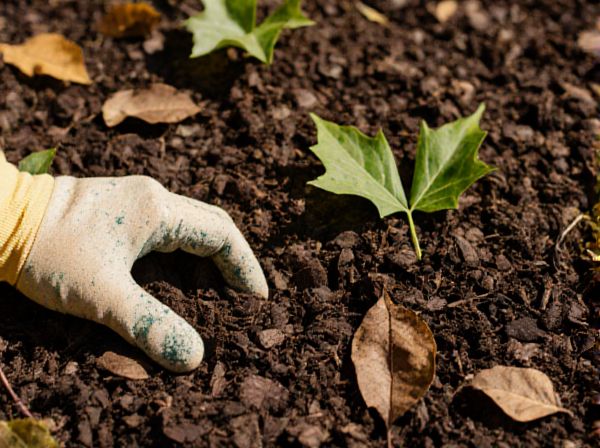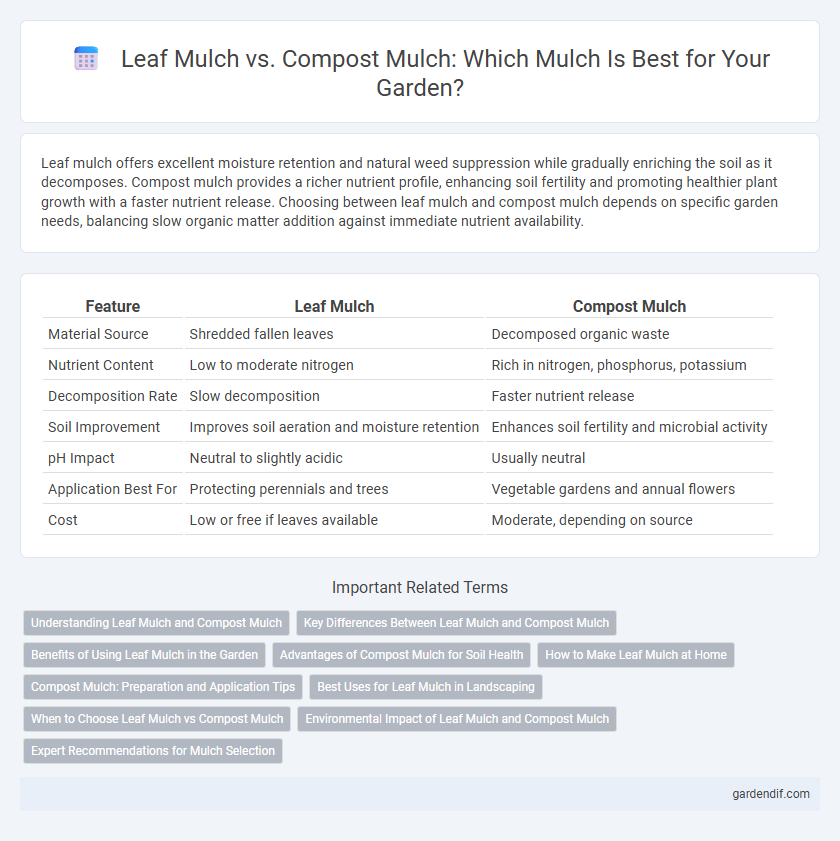
Leaf mulch vs compost mulch Illustration
Leaf mulch offers excellent moisture retention and natural weed suppression while gradually enriching the soil as it decomposes. Compost mulch provides a richer nutrient profile, enhancing soil fertility and promoting healthier plant growth with a faster nutrient release. Choosing between leaf mulch and compost mulch depends on specific garden needs, balancing slow organic matter addition against immediate nutrient availability.
Table of Comparison
| Feature | Leaf Mulch | Compost Mulch |
|---|---|---|
| Material Source | Shredded fallen leaves | Decomposed organic waste |
| Nutrient Content | Low to moderate nitrogen | Rich in nitrogen, phosphorus, potassium |
| Decomposition Rate | Slow decomposition | Faster nutrient release |
| Soil Improvement | Improves soil aeration and moisture retention | Enhances soil fertility and microbial activity |
| pH Impact | Neutral to slightly acidic | Usually neutral |
| Application Best For | Protecting perennials and trees | Vegetable gardens and annual flowers |
| Cost | Low or free if leaves available | Moderate, depending on source |
Understanding Leaf Mulch and Compost Mulch
Leaf mulch consists primarily of shredded or whole fallen leaves that retain moisture and improve soil structure by adding organic matter gradually. Compost mulch is made from fully decomposed organic waste, offering a nutrient-rich layer that enhances soil fertility and microbial activity more rapidly. Understanding the distinct decomposition rates and nutrient profiles of leaf mulch versus compost mulch helps optimize garden soil health and plant growth.
Key Differences Between Leaf Mulch and Compost Mulch
Leaf mulch consists primarily of shredded or whole leaves that decompose slowly, providing long-lasting soil insulation and moisture retention, while compost mulch is made from fully decomposed organic matter rich in nutrients, promoting faster nutrient release and enhanced soil fertility. Leaf mulch tends to improve soil structure gradually and is ideal for preventing erosion, whereas compost mulch actively enriches soil microbial life and accelerates plant growth. The choice between leaf mulch and compost mulch depends on desired soil benefits, with leaf mulch better suited for moisture conservation and compost mulch preferred for immediate nutrient supply.
Benefits of Using Leaf Mulch in the Garden
Leaf mulch enhances soil structure by improving aeration and moisture retention, promoting healthier plant roots and reducing water evaporation. Its natural decomposition releases essential nutrients like nitrogen, potassium, and phosphorus gradually, supporting sustainable plant growth. Using leaf mulch also suppresses weed growth effectively while fostering beneficial microbial activity that boosts soil fertility.
Advantages of Compost Mulch for Soil Health
Compost mulch enhances soil health by enriching it with essential nutrients and beneficial microorganisms that improve soil structure and fertility. It increases moisture retention and promotes a balanced pH, supporting robust plant growth and reducing erosion risks. Over time, compost mulch boosts microbial activity, leading to healthier, more resilient soil ecosystems compared to leaf mulch.
How to Make Leaf Mulch at Home
To make leaf mulch at home, collect fallen leaves and shred them to speed up decomposition, then pile them into a designated area or bin to allow natural breakdown over several months. Maintaining moisture and occasional turning of the leaf pile enhances microbial activity, resulting in nutrient-rich mulch ideal for garden beds. Leaf mulch improves soil structure, moisture retention, and provides a balanced source of organic matter compared to compost mulch, which undergoes a more intensive decomposition process.
Compost Mulch: Preparation and Application Tips
Compost mulch improves soil fertility by adding essential nutrients and enhancing microbial activity, making it an excellent choice for garden beds. Prepare compost mulch by shredding organic waste materials such as vegetable scraps, leaves, and grass clippings, then allowing them to decompose thoroughly in a well-ventilated pile for at least three to six months. Apply a 2-3 inch layer of compost mulch around plants, ensuring it does not touch stems directly to prevent rot and pests, and reapply annually for sustained soil health.
Best Uses for Leaf Mulch in Landscaping
Leaf mulch excels in landscaping by improving soil structure, retaining moisture, and suppressing weeds naturally. Its high carbon content supports beneficial microbial activity, enhancing nutrient cycling for healthy plant growth. Ideal for garden beds, around shrubs, and beneath trees, leaf mulch promotes a sustainable ecosystem and reduces the need for chemical fertilizers.
When to Choose Leaf Mulch vs Compost Mulch
Leaf mulch is ideal for protecting soil during fall and winter as it decomposes slowly, providing long-term insulation and moisture retention for plants. Compost mulch is best used in spring and summer to enrich soil fertility quickly, improving nutrient availability and microbial activity. Choose leaf mulch when prioritizing soil structure and weed suppression, while compost mulch suits active growing seasons requiring nutrient boost and soil amendment.
Environmental Impact of Leaf Mulch and Compost Mulch
Leaf mulch improves soil structure and moisture retention while providing habitat for beneficial microorganisms, reducing the need for chemical fertilizers and lowering carbon footprint. Compost mulch enriches soil with nutrients and organic matter, promoting healthier plant growth and enhancing carbon sequestration through decomposed organic material. Both mulches contribute to sustainable gardening by minimizing waste and supporting carbon cycling in ecosystems.
Expert Recommendations for Mulch Selection
Experts recommend leaf mulch for enhancing soil aeration and moisture retention due to its coarse texture and slower decomposition rate, which provides long-term benefits for plant roots. Compost mulch, rich in nutrients and organic matter, is advised for improving soil fertility and promoting microbial activity, making it ideal for nutrient-demanding plants. Selecting between leaf mulch and compost mulch depends on specific garden needs such as soil enhancement goals, plant types, and desired longevity of mulch effects.
Leaf mulch vs compost mulch Infographic

 gardendif.com
gardendif.com